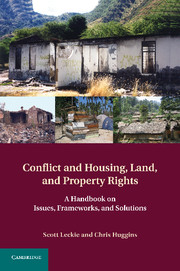Book contents
- Frontmatter
- Contents
- Opening Note and Acknowledgments
- Foreword by Dan Lewis
- 1 Introduction to the Issues – HLP Rights and Sustainable Peace
- 2 The International HLP Rights Normative Framework
- 3 Displacement, Conflict, and HLP Rights
- 4 HLP Restitution Rights
- 5 Restitution Mechanisms and Institutional Frameworks
- 6 United Nations and Other Peace Operations and HLP Rights
- 7 Protracted Displacement and Political Obstacles to the Protection of HLP Rights
- 8 Emerging Conceptual Issues
- 9 Improving International Responses to HLP Rights and Conflict
- Index
9 - Improving International Responses to HLP Rights and Conflict
The Work of NGOs in the HLP Rights Field
Published online by Cambridge University Press: 03 May 2011
- Frontmatter
- Contents
- Opening Note and Acknowledgments
- Foreword by Dan Lewis
- 1 Introduction to the Issues – HLP Rights and Sustainable Peace
- 2 The International HLP Rights Normative Framework
- 3 Displacement, Conflict, and HLP Rights
- 4 HLP Restitution Rights
- 5 Restitution Mechanisms and Institutional Frameworks
- 6 United Nations and Other Peace Operations and HLP Rights
- 7 Protracted Displacement and Political Obstacles to the Protection of HLP Rights
- 8 Emerging Conceptual Issues
- 9 Improving International Responses to HLP Rights and Conflict
- Index
Summary
HUMAN RIGHTS NGOS
Human rights NGOs working on HLP issues can broadly be divided into two categories. On the one hand are “traditional” human rights organizations that historically have focused on civil and political rights. Over approximately the past two decades, such organizations have examined economic, social, and cultural rights with increasing frequency, but their methodology largely remains based on the classic “naming and shaming” model. Examples of international NGOs in this group include Human Rights Watch (HRW) and Amnesty International. The other category of human rights NGOs is organizations intentionally established to deal with ESC rights, and their methodologies may differ from the classic human rights models. The Centre on Housing Rights and Evictions (COHRE) is an example of international NGOs in this second category. There are many local NGOs around the world that fall within both categories.
There has been an ongoing debate about the ways in which the first category of organizations, traditional human rights groups, can best address ESC rights. Violations of human rights can be committed either by omission – a failure by the state or another institution to do something required of it – or by commission – an action that robs citizens of their rights. As discussed in previous chapters, governments around the world have ratified international human rights treaties that obligate them to uphold the fundamental human rights of their citizens. Rights to housing are one example.
- Type
- Chapter
- Information
- Conflict and Housing, Land and Property RightsA Handbook on Issues, Frameworks and Solutions, pp. 248 - 276Publisher: Cambridge University PressPrint publication year: 2011

